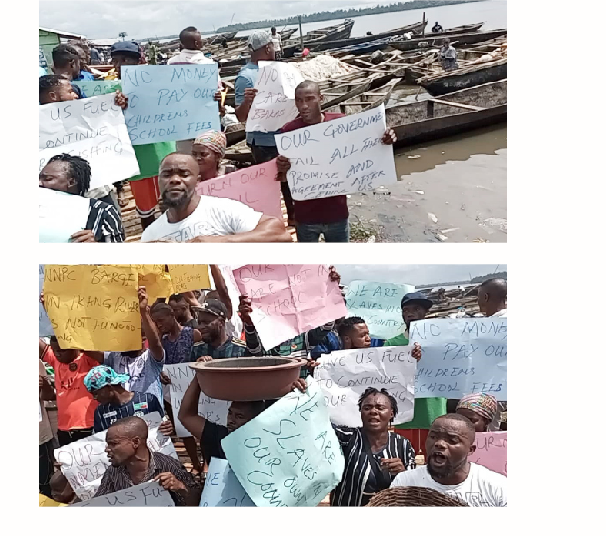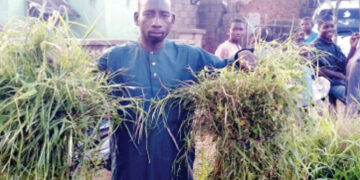Many of the displaced indigenes of Bakassi have lost any sense of belonging as neither the Nigerian Government nor the Cameroonian Government identifies with their plight.
This is even as the Internally Displaced People (IDPs) residing at Ikot Effiom Obitong re-settlement camp, Ikang Community, Bakassi, Local Government Area, Cross River State, are currently in need of rapid intervention from the government at all levels.
This is coming on the heels of the unfavourable condition faced by these people with concerns as part of their plights center on poor livelihood; poor toilet facilities as toilets constructed decades ago by the Federal Government are in shambles, and their houses are in the most deplorable state. The resultant effect of this displacement is that the children have been left to hover around without basic education due to how their parents have been left financially incapacitated.
Checks from LEADERSHIP Weekend indicate that parents and children in the resettlement camp were stopped by the Nigerian Army from fishing activities which was a major source of revenue for them.
Some of the residents who spoke to LEADERSHIP Weekend explained that soldiers drafted to the Ikang border area for “Operation Still Waters” had stopped the fishermen from purchasing petroleum products for their fishing boats, leading to over 500 fishing boats currently laying fallow at the Ikang Community beach.
Following the military operation in the area, the reduced economic activities have led to abject poverty on the part of the occupants of the camp which has put the lives of immediate families or the fishermen at risk.
Our correspondent who visited the area witnessed how dilapidated the resettlement camp looked, including how children were seen at home doing nothing while their parents who have been stopped from fishing are financially constrained to fend for their education.
The implication of this is that the community would end up producing more children who may end up constituting a nuisance as many of these kids may grow up to become kidnappers, sea pirates, rapists, and engaged in other deviant behaviors which may put the society in grave danger.
The death toll in the camp also calls for serious concerns as the people are unable to provide adequate healthcare support systems for themselves.
Some of the residents who spoke to our correspondent blamed the soldiers for banning them from purchasing petroleum product premium motor spirit which they used to power their fishing boats for fishing.
Aside from that, they alleged that the soldiers who were supposed to proffer help to their pitiable situation were seen, at checkpoints, extorting aged women returning from farms of their hard-earned money.
They also claimed that some IDPs who attempted to venture into commercial cycling (Okada) were not also spared as their motorcycles had on several occasions impounded by soldiers at checkpoints until fines were paid before they were released.
Before now, Bakassi people who suddenly became displaced lived in peace and prosperity. They lived peacefully and engaged themselves predominantly in fishing activities probably because they resided in the coastal areas. However, the outcome of the International Court of Justice at the Hague in Netherlands in 2008 ordered them to vacate their ancestral homes which were finally handed over to neighboring Cameroon, so, they suddenly found themselves residing in the IDP camps at Ikot Effiom Obutong re-settlement camp around Ikang Community of Cross River State.
Before the judgement of the Hague, these fishermen lived around the peninsula on the gulf of Guinea. Bakassi lies between the Cross River estuary, near the city of Calabar, and the Rio del Ray estuary on the east.
Residents speak
Lamenting on their ordeals, a crayfish trader, Mrs Ene Okon Edet, who claimed to have her roots in Edak Idam Community also in Bakassi LGA of Cross River State, stated that her smoke fish and crayfish business had been grounded because security operatives around the area denied them petrol to power their speed boat that takes them to the high sea.
“Army has been ceasing our fishing boats and burning them to ashes once they find fishing nets in our boats. We can’t feed our children at the moment as fishing is our only source of livelihood.
“The boat I am using to go to the high Sea to fish was purchased with a loan from LAPO (a trust unit). Am yet to repay the debt. Are we no longer Nigerians? If it is so then the federal government should show us where we belong,” Edet queried.
General secretary, IDPs, Bakassi re-settlement camp, Mr. Linus Asuquo Essien, while narrating the IDPs’ ordeals stated that the returnees are going through pain, intimidation, harassment, and economic hardship occasioned by soldiers denying them the opportunity to procure petrol to power their fishing boats.
“We have heard that we smuggle fuel to Cameroon. That is not true. We do our fishing at the high sea. You cannot expect us to buy five litres of petrol to the high sea.
“The product would get finished and you will remain floating at the high sea because you lacked petrol to propel your speed boat back to the fish port at Ikang.
“Once they see us with fishing boats with any quantity of fuel that would serve us for the time we would spend in the water, the soldiers would become infuriated and begin to flog us like cows.
“In several instances, our fishing boats ladened with fishing nets are set ablaze by the soldiers. We are poor fishermen who are very law-abiding. We have no power to engage the army in a duel. We don’t want to be engaged in criminal activities like sea piracy, or kidnapping,” he said.
“They sometimes accuse them of engaging in bunkering. The question now is, is there any oil pipeline that passes through this area no,” the camp secretary general questioned.
He added: “Our children can no longer go to school. On daily basis, our community residents who are predominantly fishermen have at regular intervals been arrested and locked up in Cameroon prisons.
“Unfortunately non of our leaders in the house of parliament or high place of authority had bothered to wade into the matter.
“We now go through hunger and starvation in the IDP camps due to our constant stay at home. Our major occupation is fishing, unfortunately, we have been barred by the soldiers from fishing.
“We have over a hundred fishermen who had been arrested by the Cameroon Gerdams and locked up in their prisons just because they were engaged in fishing.
“This is why are calling on the federal government, and United Nations to come to our aid before we perish here. Cameroonians said we are strangers, and in Nigeria, our soldiers accused us of engaging in bunkering. Where do we go from here.”
Also speaking, the secretary general, Ikang Clan Council, Chief Essien Eyo, wondered why a community that has 12 out of the 14 villages making up the community residing basically in the riverine area would be barred from carrying out fishing activities.
The traditional ruler maintained that things are so bad that several fishing boats belonging to the fishermen had been burnt down to ashes.
Other allegations levelled against the military personnel in Ikang include extortion, unnecessary intimidation, and harassment of internally displaced persons who were predominantly fishermen.
The IDPs who came out in hundreds with placards, with different inscriptions boldly written, “enough is enough” we are now slaves in our land, soldiers have inflicted us with poverty.
The IDPs called on the federal government, and international communities, to look into the inhuman treatment meted onto them before things go out of hand.
“In the last 10 months, we haven’t seen electricity in the camp nor any of the communities in Bakassi. Yet we pay taxes. In Cameroon, we are not allowed to fish. In our own country Nigeria where our oil wells were ceded to neighboring Cameroon, we are like slaves.
“We have no food to eat, our kids have dropped out of school. Our boats are parked because we lack petrol to power our boats for fishing.
“The NNPC water fuel station that used to sell petroleum products to us now lies fallow because we are not allowed to buy petrol for fishing,” he said.
Nigerian Army reacts
However military sources in Calabar denied the allegations alleging that fishermen were using their fishing boats to smuggle petroleum products to the neighboring Cameroon republic.
No official of the Nigerian army has issued any statement regarding the allegations levelled against the military’s intimidation and harassment of the IDPs and fishermen despite the media space being awash with allegations of soldiers intimidating the IDPs of Ikot Effiom Obutong re-settlement camp.
When contacted the army public relations Officer Army PRO Capt., Dorcas Aluko, stated that she was attending a course outside the state and can not comment on the issue.





